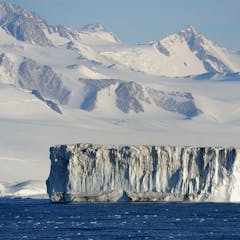
Articles on Antarctica
Displaying 1 - 20 of 330 articles

In 1898, a pioneering Antarctic expedition was stuck in sea ice for over a year. In 2024, that area is open water.

El Niño can direct more warm water to the base of West Antarctic ice shelves, accelerating melting and increasing global sea level.

There’s so much we still don’t know about whales. Here’s 3 amazing new things we’ve learnt about whales lately: how humpback whales have sex and give birth – and how baleen whales sing underwater.

The sub-zero area of Antarctica has shrunk by over 100km since the 1950s.

In our market-driven world, calculating the economic value of the environment can be a useful tool in garnering support for environmental protection.

To narrow our predictions of global sea level rise, we need to know more about these sudden ‘non-linear’ changes to ice sheets.

Five recent novels about the Antarctic make for cool reading on a hot summer day.

A heatwave in 2022 redefined scientific expectations of the Antarctic climate. Now the global community must prepare for what a warmer world may bring.

A deadly strain of bird flu is circulating in animals. So far the virus has been detected in seabirds on islands near Antarctica. What does this mean for wildlife, tourism and research?

Did the enormous West Antarctic Ice Sheet collapse the last time global temperatures were 1.5°C above preindustrial levels? The answer lay in the DNA of an octopus.

Pine Island Glacier passed a tipping point decades ago, and it could do again in the future.

The proliferation of Antarctic research stations – 77 in all – is increasing knowledge of the continent but also the human impacts. A new study has identified the best ways to limit these impacts.

Seafloor sediments from beneath the Ross Ice Shelf represent an archive of warmer periods in Earth’s past. An ambitious international project aims to uncover what we can learn about our hotter future.

Humanity has lost control of West Antarctic ice-sheet melting.

The first comprehensive assessment of trends in Southern Ocean ecosystems reveals an urgent need to address climate change. The summary for policymakers can guide decision-makers.

The rapid changes in the Southern Ocean and Antarctica highlight the urgency of better direct observations and measurements, beyond satellite monitoring and modelling.

If we want to live in a world with Emperor penguins, we need to cut emissions steeply and protect parts of the ocean around Antarctica where climate change will have the biggest impact.

Sea ice around Antarctica has always followed a predictable seasonal cycle. Now, we’ve experienced a sudden dramatic loss, and the changes are here to stay.

After several decades in research, including 22 years at the Australian Antarctic Division, this scientist is standing up for our icy continent. Here’s why Antarctic research needs ongoing funding.

Sea ice extent in July 2023 has been around 10% below last year’s record low for the month.
